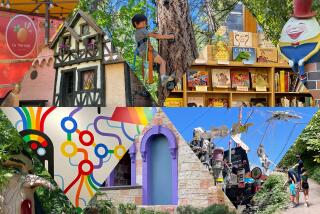Preventing Disasters Before They Happen
- Share via
It’s time to ‘fess up. The kids have figured it out anyway. Despite my best efforts and no matter how carefully I plan, situations occasionally go awry on our family trips.
The disasters stick best in the kids’ memories: spending New Year’s Eve sick in bed in San Diego, getting lost on a dark road outside Tucson, spending two hours searching for a ghost town we never found. While these can be adventures in themselves, I still try my best to keep our trips pleasurable, and I have actually learned a few things about avoiding disasters. So, as everyone gets down to serious summer vacation planning, I thought it might be a good time to answer a few questions readers often ask.
Q. What’s the best way to avoid a disastrous vacation and keep the kids happy?
A. Being relaxed is essential. Cutting any itinerary in half is second. Remember, the kids want to play more than they want to sightsee. One attraction per day is enough. Spend the rest of the day in a playground, flying a kite in a park, taking a hike or swimming. Just as important, let the children have a say in what you’re going to do each day. The more involved they feel in the trip, the happier they’ll be.
Q. What items should parents traveling with children never leave home without?
A. The pediatrician’s phone number, postcard stamps so that the kids can send cards, motion sickness medicine, pain relievers, sunscreen, bandages, a plastic container of bubbles, bubble gum, a book with short chapters (for kids) and a new mystery novel (for parents).
Q. How can we pick a type of vacation our children will enjoy?
A. Think about what you want to do as well as what will make the kids happy: tennis or golf, an ocean or the mountains, a cottage or hotel with all the amenities. Ask the kids what they want to do and look for a place where you can all find something to enjoy. Wherever you go, make sure there will be kids of similar ages around.
Q. How can we get the most out of our limited vacation budget?
A. Work with a travel agent who is knowledgeable about family travel. Watch ads for airline and hotel promotions geared toward families. When calling to reserve space at a hotel or resort, ask if there are any special family packages: Can kids stay free or eat free? Is it possible to book a second room at half the price of the first? Does the hotel or resort stay include benefits, such as discounted admission to a nearby theme park or attraction?
Condos or cottages are usually more economical than hotels for families because meals don’t have to be eaten in restaurants. Camping and picnics, of course, are excellent ways to stretch the vacation dollar.
Q. What’s the best way to survive a car trip, especially a long one that takes several days?
A. Plan frequent stops along the way where the kids can run and jump. Stop early enough in the day so they’ll be able to get in a swim at the hotel pool and, perhaps more important, have that experience to look forward to. Carry plenty of water and healthful snacks. Books on tape are a great diversion for older kids and individual tape players and earphones inhibit quarreling and keep the noise level down.
Q. What’s the best way to handle illness on the road?
A. If the children become ill, try to reach your family doctor. If that’s impossible, ask relatives or even the hotel concierge for a referral. Or head to the emergency room of a children’s hospital or the largest hospital in the area. Try not to wait until it’s 2 a.m. and a real emergency before seeking medical help. Always pack first-aid necessities.
Q. Is there any preferable way to approach a theme park experience?
A. Keep expectations in line with reality. Many have long lines and crowds everywhere. The kids may get overwhelmed after just a few hours and may want to spend the afternoon at the pool. Let them. It won’t be fun if you try to see everything.
Taking the Kids appears weekly.
More to Read
Sign up for The Wild
We’ll help you find the best places to hike, bike and run, as well as the perfect silent spots for meditation and yoga.
You may occasionally receive promotional content from the Los Angeles Times.






